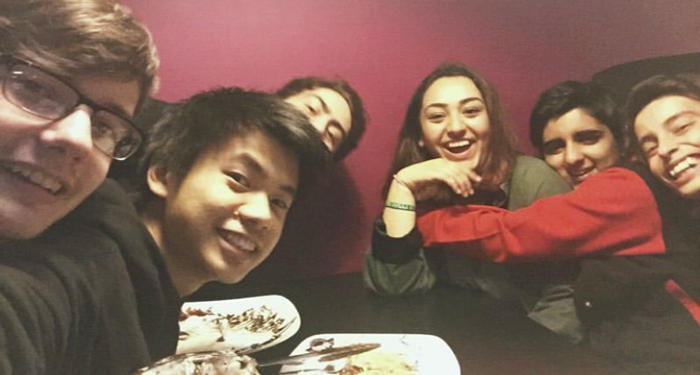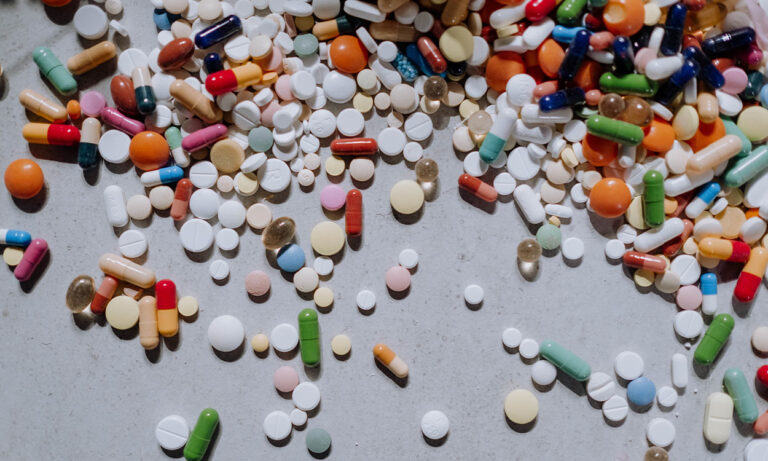Overcoming my opioid addiction: an endometriosis sufferer’s battle
“On the day 4 years ago,” my Instagram notification reads. I click on it and my screen opens up to a picture of a group of students smiling at a dessert parlour. Among them is me. I take a screenshot and send it on the group chat.

Me: Do you guys remember this?
Zachary: Omg I can’t believe that was 4 years ago
Joshua: Good times ah
Jason: That was a good day
Me: I can’t remember any of it…
In fact, I can barely remember the last five years, I realise. I open my camera roll and scroll back to the summer of 2016—the last summer that I can just about recall. I spend hours observing the memories of the last half a decade. I come across pictures of myself at birthdays, graduations, weddings, parties, and more, yet I can’t remember being at any of them. I realise then, that I can’t remember the best years of my life. In that moment, I knew something needed to change.
At this point it had been six years since I had been diagnosed with endometriosis, a chronic condition in which tissue similar to that found in the lining of your womb begins to grow elsewhere in your body, causing debilitating pain, heavy bleeding, bowel and bladder issues, among a number of other symptoms. In my case, the condition is advanced and has spread to the outside of my pelvis, meaning my organs are now beginning to stick together. While the disease can be controlled with contraception and painkillers, or through carefully executed surgery, there remains no cure.
About a year into my diagnosis, and just after my first surgery in June 2017, my endometriosis pain became so severe that it prevented me from living any semblance of a normal life. At this point, I was in the midst of my undergraduate degree but had pretty much spent the last year in bed. Every aspect of my life had been affected by my diagnosis, from my studies and career expectations to my friendships and relationships.
“Just take ibuprofen and paracetamol regularly,” every doctor I would see told me—as if putting a plaster over a bullet wound was enough to fix it. By the time I found a doctor who understood the severity of my pain and genuinely wanted to help me, my condition had worsened significantly. I constantly felt as if there were dozens of sharp, heated knives scraping and stabbing at my pelvis.
“I’m prescribing you some dihydrocodeine.” This was the first time since my diagnosis that a doctor had been willing to prescribe me a medication that was stronger than those you would find in the aisles of every supermarket. It felt like a mini victory—although I didn’t want to be in pain, it was nice to finally find a doctor who believed that my condition was severe.
Unfortunately, the dihydrocodeine barely alleviated the pain. So, he doubled the dosage. And then tripled it. When that didn’t work, he prescribed me tramadol. And again, he doubled the dosage, then tripled it. But even then, the pain kept worsening. So, he prescribed me morphine. And just like that, it was January 2022 and as I sat there scrolling through my camera roll and reminiscing over the past, I realised I had been taking opioids every day since June 2017. As a result, I missed out on the best years of my life.
Although I had heard of opioid addiction through the broader media and from the portrayal of characters on shows like Grey’s Anatomy, I had never really considered it in the context of the real world. After all, it’s not like I was taking these painkillers recreationally. I had taken them for the last five years because I was in agony, and I didn’t want to be. Unlike the TV characters I saw making frequent trips to rehab or sneaking through the cabinets in their friend’s bathroom to try and score some more drugs, I didn’t display any of the stereotypical attributes of an addict.
Despite the fact that my pain was still very much there, and in some ways worse than ever before, I knew that if I stopped taking opioids, I could at least regain some control over my life. I did not want to spend the next few decades in a zombie-like haze, just drifting my way through life without actually taking it in. I wanted to be present.
The bittersweet route to getting off opioids
But no one could prepare me for what would happen next. Having lived in severe pain for a long time and enduring multiple surgeries, as well as other medical procedures, I guess you can say I’m a pretty strong person—or at least I would like to think I am. But as I sit here today, I can say with certainty that opioid withdrawal is one of the most physically and mentally torturing processes that I have been through.
I had assumed that because I wasn’t ‘addicted’ in the traditional sense, like those characters in the films and TV shows I had seen, I would simply be able to stop taking them and go on with my life. But science does not discriminate. I had no idea that your body can form an addiction to opioids after just taking them for five consecutive days. I wasn’t aware that over 2,000 people died in the UK in 2021 as a result of opioids. And I had never been warned about the fact that it would take me over ten months of slowly reducing my dosage before I would eventually be free of opioids.
As I write this, it’s been seven weeks since I completely stopped taking opioids. This victory is bittersweet. Although I can already feel myself regaining mental clarity and energy, I also feel anger for the time I lost. While I know that by prescribing me these painkillers, my doctors were just trying to help me, I also wish that they would have warned me of the possibility of addiction and the brutality of withdrawal. But they aren’t to blame—the issue is much larger than them, or me.
34-year-old Radha from Leicester, UK, was also prescribed opioids as strong as fentanyl to treat her endometriosis symptoms. But after years of consecutive use, Radha noticed that these painkillers were having a significant impact on her mental wellbeing: “As soon as I started getting those suicidal thoughts, it scared me because I sat there with a bottle of morphine, fentanyl patches, and sleeping pills on my bed. And I thought, ‘this is not good. This is scary’.”
In that moment, Radha too realised something needed to change. She mentioned what she did next: “I spoke to one of my endometriosis friends at the time and told her I’m getting really horrible thoughts right now. And I said, I’m so reliant on these drugs and I can’t function without them, because they’re the only things that will relieve me of my pain. And then my friend told me to give that box of medication to my mum so that she would be in charge of making sure I only took them when needed.”
Since then, Radha has made the decision to completely stop taking opioids and gain back her quality of life. But like me, she was concerned by the casual attitude that healthcare professionals have when it comes to prescribing those with chronic issues such strong opiates. “It was never taken into consideration that individuals like me are taking these very addictive opioids without any thought about the effect it has on them,” Radha continued.
“There was no psychological support. There was no check-up. There was no one saying, ‘Let’s have a review of your medication after a couple of weeks’. I remember just having them give me some more and increasing it and increasing it. I just kept thinking, how long? How long do I have to keep increasing this? It was quite a traumatic experience, to say the least.”
The opioid crisis and the hopeful way forward
In 2017, the US Department of Health and Human Services (HHS) declared that the US was in the midst of an opioid crisis, with over 1.5 million people admitting they had an opioid use disorder in 2019 alone. And it seems that the UK is following in its footsteps, with the rate of opioid prescriptions having increased by 34 per cent in England between 2008 and 2018.
But why is it that people like Radha and I, who took opioids for valid reasons, were never warned about the potential side effects? Ewan Maule, Director of Medicines and Pharmacy at the North East and North Cumbria Integrated Care Board (ICB), spoke to me about why those from vulnerable communities are more likely to be prescribed the medication in question. “We know that opioids are frequently prescribed to more deprived populations and even more so in the North than in London, for example,” the expert shared. “And the same is true for people reporting their experiences with chronic pain.”
“So, putting all that together what we know is that, if you live in a deprived area in the North, you are more likely to experience chronic pain—and therefore take opioids and become addicted to and potentially die from the medication than if you live in a similar area in the South, or in a less deprived area,” Maule explained.
Fortunately, Radha and I were able to overcome our dependence on opioids despite never having been warned that this would be a possibility by our general practitioners or doctors. But what about other members of the chronically ill community who may not have the support or knowledge to allow them to make that step? Will they continue to spend the rest of their lives suffering?
Thankfully, it appears the National Health Service (NHS) is adamant about tackling this issue before the UK enters an opioid epidemic like the US. Maule enlightened me about the Painkillers Don’t Exist campaign, which “aims to raise awareness of the dangerous effects of long-term high-dose pain medication and empower people living with pain to make informed decisions about their health.”
“Opioids can be very effective at managing short-term acute pain, and in cancer or end-of-life pain. But when taken for longer than three months, they are unlikely to be effective and more likely to cause addiction and dependence on top of the underlying chronic pain,” the expert said. “We are about to launch a new phase of the campaign that will hopefully ensure nobody ends up in the position you did—everyone should have the risks discussed with them before they take opioids for any length of time.”
Even now, there are brief moments in which I feel a strong desire to give in—moments where the pain is so severe that all I want is to take a few tablets of tramadol. But then I think about how far I’ve come. I think about those ten months it took me to wean off opioids. I think about those five years of hazy memories. I think about that notification that changed everything.





